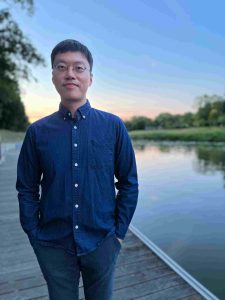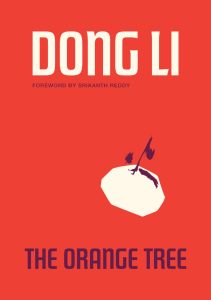Read an Interview with Dong Li, author of “The Orange Tree”
As we enter the relaunch of the Phoenix Poets series, we’re introducing the new editors and poets through a series of short interviews. Below, we speak with Dong Li, whose new book, The Orange Tree, is the recipient of the inaugural Phoenix Emerging Poet Book Prize for 2023. Li, a multilingual poet and translator who was born and raised in China and educated at Deep Springs College and Brown University, shares insight into his relationship to language and into the process of putting together his debut collection.

Tell us a little about yourself and your relationship to poetry.
I fell in love with American English in the Californian desert, where I started over in college. The desert has a voice, so they say. It was my own echo I heard, amplified by the surrounding Sierras. Afterward, the deep silence. I ate clouds of longing and picked sorrowful sounds off tumbleweeds. I missed family and familiar faces, but my curiosity was relentless. I absorbed words and voices that embodied them, as I stumbled to better my English and engage more in class. Simple words were my best companions. I said hello to them every day and held onto them when my hands sweated. Poetry began for me when I was able to give a speech at this tiny college about my family. It was a personal language unlocked by American idioms and propelled by a portable urgency to speak out what kept echoing and never let up. In that echo and its continuum, through other voices, other words, other languages, that’s where I think poetry stands companionly by us all and calls upon us to express it in our own ways.
What’s something you’re particularly excited about with your new book?
Since this is my debut, I feel somewhat more legitimate now on this long and arduous journey. It thrills me every time to wrestle with a messy chorus of forms and feelings and to contain them in a book without softening their edges. I wrote many of the little sections a long time ago and was happy to give them a new hear after their echoes became slowly distant. I adjusted the manuscript to welcome the foreword into the whole ensemble. I was pulling my hair out deciding whether to remove the opening poem or not. I was glad to let it go, hoping its invisible trace would lend strength to the book. I am particularly excited to see how Xu Jing’s striking Chinese characters animate the cover and pair seamlessly with the section breakers of invented compound words. Kudos to the designer Mint Liu. The section breakers could be read as a translation of the sections, or vice versa. I want all the elements of the book to echo each other.
Do you consider your writing process to be primarily solitary or collaborative?
I think of both as part and parcel of the same strenuous process. Only in silence can I listen most attentively and catch that echo of what’s trembling inside me and wants to get out. Yet, the echo often contains multitudes and commands collaboration with other mediums and means. In my case, there is always an enormous resistance on the page when I try to position words into order. I have to trick-or-treat them and use everything at my disposal. I love that kind of wrestle. I listen to the material and try to get at its vocabulary. Words are mulled over solitarily, but nobody owns them. We share them. When I write, I am collaborating with this vast presence of words and voices that give them life and nuance. The echoing extends.
The Orange Tree is available now from our website or favorite bookseller.
